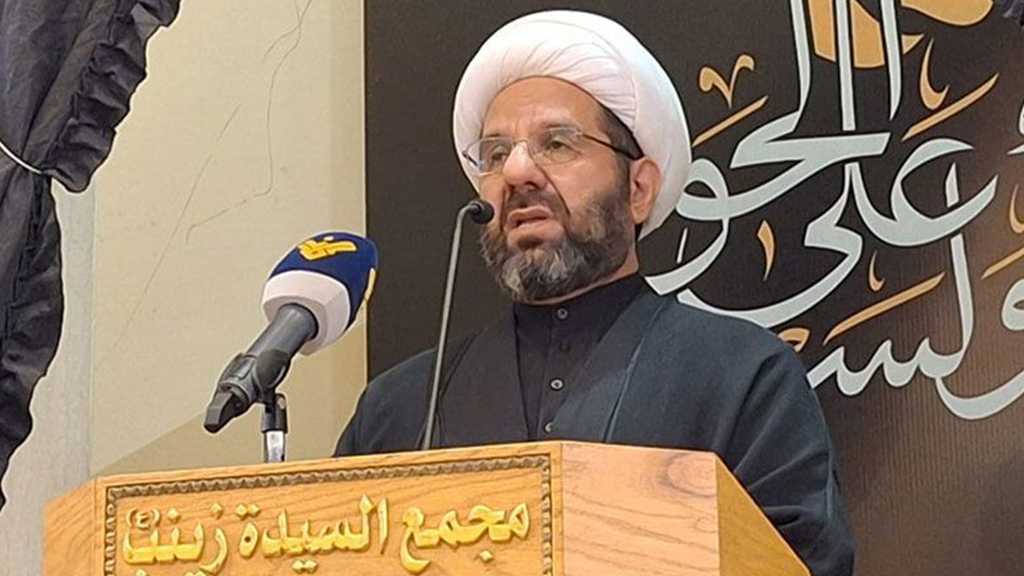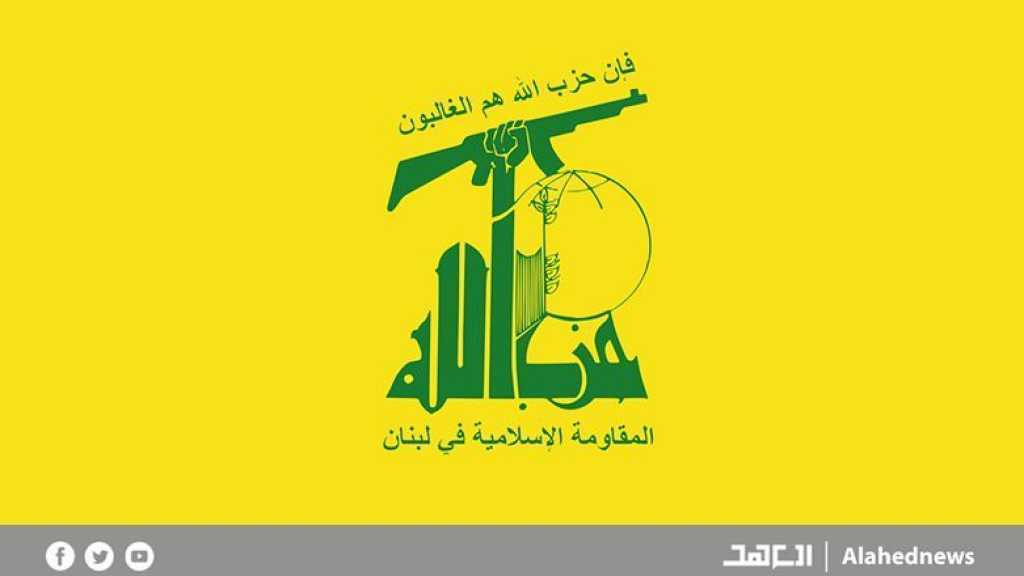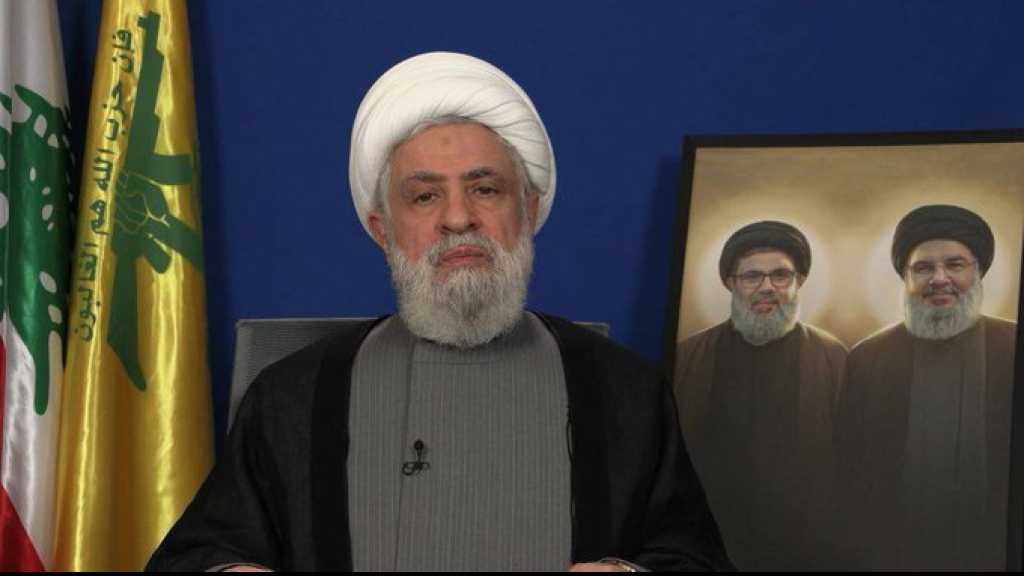General Federation of Labor Unions (GFLU) in Hizbullah issued its annual document: Lebanon entered a new-post Doha Acco

30/08/2008
Hizbullah General Federation of Labor Unions, issued the annual document at the conclusion of its Ninth Unionist Camp of Allegiance, held this year between 14 and 24-8-2008, with the participation of labor, agriculture and trade unions, from Bekaa, the south, Mount Lebanon, Beirut and the north.
This coincided with two momentous occasions, the birth anniversary of the awaited Imam Mahdi [may god hasten his return (MGHHR) and the second anniversary of the July-August 2006 'Divine Victory'.
Participating trade unionists and labor committees at the Unionist Camp of Allegiance, wished the Lebanese in general, Muslims in particular, the resistance and its mujahideen the best wishes for the beginning of God 's holy month of Ramadan, month of jihad, patience, goodness and blessings; asking God Almighty to grant victory to this nation against its enemies, to permit the re-emergence of the greatest sentry, the awaited testimony and authority that is expected to reinstall justice and fairness into the world, Imam al-Muntazar (MGGHR).
Camp participants forwarded their best wishes and greetings to the makers of the nation's victory in July 2006, to the martyrs of the ‘Truthful Pledge', to all the martyrs of the resistance and the nation, to the master of martyrs Sayyed Abbas Moussawi, to their Sheikh, Sheikh Raghib Harb, to the Commander Hajj Imad Moghnieh, to the strugglers and the wounded, to the martyrs' families, the liberated detainees, to the pioneering guide of the resistance, the concealed Imam Moussa al-Sadr, to all the Mujahedeen active in upholding the resistance pledge, to the resistance leader and guardian of the homeland and its sons, his eminence the Secretary General Sayyed Hassan Nasrallah.
We give the greatest tribute and kindest greetings to them, and thank them for the values, the goodness and the path that has and continues to safeguard the pride of the homeland and nation.
First: the general national concern:
The General Federation of Labor Unions considers that Lebanon after the Doha agreement entered a new Lebanese reality, a new political foundational phase, in all its dimensions, which we ought to accompany to a state of respecting the constitution and the law, in the direction of activating the work of councils, institutions and official departments, the compliance with their functions and powers, and the commitment and application of their laws in text and spirit, to achieve the set out objective.
This is especially so within the Social Economic Council, the National Social Security Fund, the National Employment commission, the Labor arbitration councils and the National Centre for vocational training and other tri-representational institutions and councils.
Second: The Economic and Social concern:
1. Regarding the economic and social strategy for Lebanon.
The diversity and complexity of the economic and social problems faced by the homeland and the citizens indicate an old case of loss and scattering of economic and social ideas and visions for Lebanon.
There is a broad based political and formal discussion about Lebanon's domestic and regional economic cycle and role and about what is suitable and what is not. The needs for this debate have been increasing en par with the demand for building the strong state, especially in the era of globalization, when the strength of any state resides in an economy independent from foreign (political) will.
Such economy protects the state and becomes part of its identity and status, thereby uniting the nation and its citizens.
The national debate about the social and economic strategy for Lebanon, a strategy whose drafting and responsibility involves everyone's participation, is an urgent necessity, since none can bear the responsibility for keeping the nation economically weak and socially threatened.
2. On privatization & public property of the State:
In order for privatization not to become an instrument to loot the homelands and block growth and development, or to bring in outside interference to charter the home's identity and role, independent discussion of each of the files on privatization, according to the exigencies of national interest, is the best way to diagnose the national interest in privatizing this sector or that.
Sound national considerations are capable of settling controversy on benefits and disadvantages of privatization in Lebanon, a country that possesses sufficient number of nationalist economic experts with clean hands to discuss this subject.
3. On amending the minimum wage level & correcting wages
Law 36/67, has formed an economic and social umbrella that has provided protection for Lebanon's workers, production forces and for the Lebanese economy, it has laid the requirements and mechanisms according to which to amend the minimum wage in Lebanon and to correct wages in the public and private sectors, in equivalence with the annual increase ratio in cost of living.
It has respected the principle of equality among the Lebanese in rights and duties, as it has also acted as the fundament protector of the rights of Lebanon's workers and employees.
What is required now is the adoption of mechanisms of the law 36/67 in amending the minimum wage and correcting wages, rather than regressing backward on the social security file of the Lebanese.
4. On foreign labor & unemployment fund
Foreign labor exists in all countries of the world, its elimination is not required in Lebanon, what is required is its organization and the reduction of its impact on the Lebanese labour force. This is when Lebanese laws and the laws of a number of existing institutions (the National Social Security Fund, the National Foundation for Employment...) contribute significantly in this organization. What is required is the implementation of these laws to protect job opportunities for the Lebanese and preserve their rights to compete.
The most important of the laws to be implemented is the declaration of foreign labor employment to the Security Fund, the payment of the required relevant contributions, and the establishment of the national unemployment fund, which is supposed to be primarily fed by fees on foreign labor and duties on imported goods.
5. On the state's role in social welfare & protection of the National Social Security Fund:
The specifics of the Lebanese society and the imperatives of its unity require the government to ensure the provision of an umbrella of social protection in health, education, housing and social security. Preserving the National Social Security Fund is one of the priorities to maintain social security at home, the development of this institution and the expansion of its services to include the broader segment of workers, farmers, fishermen and artisans of the homeland, is a general national demand.
The Government should regularly fulfill its financial and legal obligations towards this national public institution.
6. On food security & bread:
Supporting the productive industrial and agricultural sectors, combating monopolisation and imitation and the production of a quality national commodity in a secure and stable manner, form a prerequisite for providing food security in the face of fluctuations in world prices and strategic political playing, production and marketing wise, in the global market.
Lebanon does not need unsound policies, to produce sufficient quantity and quality industrial and agricultural goods, in order for it to overcome orchestrated crises such as the bread crisis, or the rising global prices of some goods. Was not Lebanon a regional repository of wheat silos one day?
Third: The agricultural sector
Lebanese farmers and their trade union and cooperative corps indicate that approximately 46% of the Lebanese live off revenues from the agricultural sector and its activity. Lebanon's need for the agricultural sector is linked to the necessities of the strength of its economic productivity and food security.
The natural approach to solving the crises of the agricultural sector and to transitioning the country from a faltering agricultural state to a developed nation, capable of guaranteeing its own food security, comes from listening to farmers to meet their demands for crop protection and agricultural support, to the establishment of an agricultural security fund against natural disasters, and for making the compensation payments due the farmers for damages incurred in war and natural disasters, in addition to admitting farmers and fishermen into the National Social Security Fund, and formally involving them in managing the affairs of this sector through specialized joint committees, and the introduction of agriculture production policies.
Fourth: in the industrial sector
The same conditions of neglect, prejudice and lack of appreciation that exist in the agricultural sector also exist here in the industrial sector, where no country unjustly treats its own industry the way Lebanon does.
This country with all the readiness and preparedness possessed by its sons for recovery and renewal... also has what it has in slackness and discouragement by its officials and successive governments. It is as if the fate of this country is to frustrate its young and old, to nurture the dependence mentality against the spirit of self-sufficiency.
Listening to the voice of industrialists and resolving their problems is the natural approach to solving the crisis of industry and production in Lebanon, for they possess competencies and capabilities, in word and in deed, enabling them to solve the dilemmas.
If only they could be heard, we would eat and produce from what we sow, we would dress and consume what we ourselves make.
Fifth: On trade unions and workers demands
The trade union movement is invited to a new foundational unionist revival in the history of modern Lebanon, especially after the formation of a government of national unity, and its embarking against a vague and questionable ministerial statement with regards to the two economic and social issues.
The priorities we see in the trade union movement at this stage include:
1. The labor union movement is invited to work on the development of organizational structures of trade union representation of workers, to place its available moral and material capabilities in the service of this goal. It also calls for a thorough review of options and methods for electing its representatives to the boards and the tri-leveled representation commissions, to arrive at an effective trade union movement with its existing institutions of committees and constitutional bodies.
To stimulate and revive the movement's organizational and managerial levels, and its work and accounting programs;
to implement its laws and internal regulations in the trade union process of making stands and decisions that preserve its unity and guarantee the widest possible participation and representation of Lebanese workers in taking the positions regarding demands and trade union affairs.
2. The prevention of workers and employees from joining trade unions and their punishment and dismissal from work because of their trade union activity is a violation of the laws that runs without receiving adequate legal and trade union buffer.
The restoration of rights to trade unions and workers, in both public and private sectors, and the right of workers and employees to belong to trade unions are essential responsibilities of the Lebanese trade union movement, which in turn has to insist on the Lebanese laws and international treaties to realize this right for Lebanon's workers and their trade union movement.
3. Law 36/67, is one of the fundamental economic and social cornerstones that preserved the homeland, in its current format, it is the principal legal guarantor of the workers and employees rights to an annual review of the increased rates in living costs and the consequent adjustment of the minimum wage level and wage correction in both public and private sectors.
Under the current circumstances, the trade union movement bears an historic responsibility to uphold this law and confront attempts made at toppling and eliminating it in favour of narrow individual interests, at the expense of broad national interests.
Peace and best wishes for the resistance, Lebanon and the Lebanese.
General Federation of Labor Unions in Hizbullah
Hizbullah General Federation of Labor Unions, issued the annual document at the conclusion of its Ninth Unionist Camp of Allegiance, held this year between 14 and 24-8-2008, with the participation of labor, agriculture and trade unions, from Bekaa, the south, Mount Lebanon, Beirut and the north.
This coincided with two momentous occasions, the birth anniversary of the awaited Imam Mahdi [may god hasten his return (MGHHR) and the second anniversary of the July-August 2006 'Divine Victory'.
Participating trade unionists and labor committees at the Unionist Camp of Allegiance, wished the Lebanese in general, Muslims in particular, the resistance and its mujahideen the best wishes for the beginning of God 's holy month of Ramadan, month of jihad, patience, goodness and blessings; asking God Almighty to grant victory to this nation against its enemies, to permit the re-emergence of the greatest sentry, the awaited testimony and authority that is expected to reinstall justice and fairness into the world, Imam al-Muntazar (MGGHR).
Camp participants forwarded their best wishes and greetings to the makers of the nation's victory in July 2006, to the martyrs of the ‘Truthful Pledge', to all the martyrs of the resistance and the nation, to the master of martyrs Sayyed Abbas Moussawi, to their Sheikh, Sheikh Raghib Harb, to the Commander Hajj Imad Moghnieh, to the strugglers and the wounded, to the martyrs' families, the liberated detainees, to the pioneering guide of the resistance, the concealed Imam Moussa al-Sadr, to all the Mujahedeen active in upholding the resistance pledge, to the resistance leader and guardian of the homeland and its sons, his eminence the Secretary General Sayyed Hassan Nasrallah.
We give the greatest tribute and kindest greetings to them, and thank them for the values, the goodness and the path that has and continues to safeguard the pride of the homeland and nation.
First: the general national concern:
The General Federation of Labor Unions considers that Lebanon after the Doha agreement entered a new Lebanese reality, a new political foundational phase, in all its dimensions, which we ought to accompany to a state of respecting the constitution and the law, in the direction of activating the work of councils, institutions and official departments, the compliance with their functions and powers, and the commitment and application of their laws in text and spirit, to achieve the set out objective.
This is especially so within the Social Economic Council, the National Social Security Fund, the National Employment commission, the Labor arbitration councils and the National Centre for vocational training and other tri-representational institutions and councils.
Second: The Economic and Social concern:
1. Regarding the economic and social strategy for Lebanon.
The diversity and complexity of the economic and social problems faced by the homeland and the citizens indicate an old case of loss and scattering of economic and social ideas and visions for Lebanon.
There is a broad based political and formal discussion about Lebanon's domestic and regional economic cycle and role and about what is suitable and what is not. The needs for this debate have been increasing en par with the demand for building the strong state, especially in the era of globalization, when the strength of any state resides in an economy independent from foreign (political) will.
Such economy protects the state and becomes part of its identity and status, thereby uniting the nation and its citizens.
The national debate about the social and economic strategy for Lebanon, a strategy whose drafting and responsibility involves everyone's participation, is an urgent necessity, since none can bear the responsibility for keeping the nation economically weak and socially threatened.
2. On privatization & public property of the State:
In order for privatization not to become an instrument to loot the homelands and block growth and development, or to bring in outside interference to charter the home's identity and role, independent discussion of each of the files on privatization, according to the exigencies of national interest, is the best way to diagnose the national interest in privatizing this sector or that.
Sound national considerations are capable of settling controversy on benefits and disadvantages of privatization in Lebanon, a country that possesses sufficient number of nationalist economic experts with clean hands to discuss this subject.
3. On amending the minimum wage level & correcting wages
Law 36/67, has formed an economic and social umbrella that has provided protection for Lebanon's workers, production forces and for the Lebanese economy, it has laid the requirements and mechanisms according to which to amend the minimum wage in Lebanon and to correct wages in the public and private sectors, in equivalence with the annual increase ratio in cost of living.
It has respected the principle of equality among the Lebanese in rights and duties, as it has also acted as the fundament protector of the rights of Lebanon's workers and employees.
What is required now is the adoption of mechanisms of the law 36/67 in amending the minimum wage and correcting wages, rather than regressing backward on the social security file of the Lebanese.
4. On foreign labor & unemployment fund
Foreign labor exists in all countries of the world, its elimination is not required in Lebanon, what is required is its organization and the reduction of its impact on the Lebanese labour force. This is when Lebanese laws and the laws of a number of existing institutions (the National Social Security Fund, the National Foundation for Employment...) contribute significantly in this organization. What is required is the implementation of these laws to protect job opportunities for the Lebanese and preserve their rights to compete.
The most important of the laws to be implemented is the declaration of foreign labor employment to the Security Fund, the payment of the required relevant contributions, and the establishment of the national unemployment fund, which is supposed to be primarily fed by fees on foreign labor and duties on imported goods.
5. On the state's role in social welfare & protection of the National Social Security Fund:
The specifics of the Lebanese society and the imperatives of its unity require the government to ensure the provision of an umbrella of social protection in health, education, housing and social security. Preserving the National Social Security Fund is one of the priorities to maintain social security at home, the development of this institution and the expansion of its services to include the broader segment of workers, farmers, fishermen and artisans of the homeland, is a general national demand.
The Government should regularly fulfill its financial and legal obligations towards this national public institution.
6. On food security & bread:
Supporting the productive industrial and agricultural sectors, combating monopolisation and imitation and the production of a quality national commodity in a secure and stable manner, form a prerequisite for providing food security in the face of fluctuations in world prices and strategic political playing, production and marketing wise, in the global market.
Lebanon does not need unsound policies, to produce sufficient quantity and quality industrial and agricultural goods, in order for it to overcome orchestrated crises such as the bread crisis, or the rising global prices of some goods. Was not Lebanon a regional repository of wheat silos one day?
Third: The agricultural sector
Lebanese farmers and their trade union and cooperative corps indicate that approximately 46% of the Lebanese live off revenues from the agricultural sector and its activity. Lebanon's need for the agricultural sector is linked to the necessities of the strength of its economic productivity and food security.
The natural approach to solving the crises of the agricultural sector and to transitioning the country from a faltering agricultural state to a developed nation, capable of guaranteeing its own food security, comes from listening to farmers to meet their demands for crop protection and agricultural support, to the establishment of an agricultural security fund against natural disasters, and for making the compensation payments due the farmers for damages incurred in war and natural disasters, in addition to admitting farmers and fishermen into the National Social Security Fund, and formally involving them in managing the affairs of this sector through specialized joint committees, and the introduction of agriculture production policies.
Fourth: in the industrial sector
The same conditions of neglect, prejudice and lack of appreciation that exist in the agricultural sector also exist here in the industrial sector, where no country unjustly treats its own industry the way Lebanon does.
This country with all the readiness and preparedness possessed by its sons for recovery and renewal... also has what it has in slackness and discouragement by its officials and successive governments. It is as if the fate of this country is to frustrate its young and old, to nurture the dependence mentality against the spirit of self-sufficiency.
Listening to the voice of industrialists and resolving their problems is the natural approach to solving the crisis of industry and production in Lebanon, for they possess competencies and capabilities, in word and in deed, enabling them to solve the dilemmas.
If only they could be heard, we would eat and produce from what we sow, we would dress and consume what we ourselves make.
Fifth: On trade unions and workers demands
The trade union movement is invited to a new foundational unionist revival in the history of modern Lebanon, especially after the formation of a government of national unity, and its embarking against a vague and questionable ministerial statement with regards to the two economic and social issues.
The priorities we see in the trade union movement at this stage include:
1. The labor union movement is invited to work on the development of organizational structures of trade union representation of workers, to place its available moral and material capabilities in the service of this goal. It also calls for a thorough review of options and methods for electing its representatives to the boards and the tri-leveled representation commissions, to arrive at an effective trade union movement with its existing institutions of committees and constitutional bodies.
To stimulate and revive the movement's organizational and managerial levels, and its work and accounting programs;
to implement its laws and internal regulations in the trade union process of making stands and decisions that preserve its unity and guarantee the widest possible participation and representation of Lebanese workers in taking the positions regarding demands and trade union affairs.
2. The prevention of workers and employees from joining trade unions and their punishment and dismissal from work because of their trade union activity is a violation of the laws that runs without receiving adequate legal and trade union buffer.
The restoration of rights to trade unions and workers, in both public and private sectors, and the right of workers and employees to belong to trade unions are essential responsibilities of the Lebanese trade union movement, which in turn has to insist on the Lebanese laws and international treaties to realize this right for Lebanon's workers and their trade union movement.
3. Law 36/67, is one of the fundamental economic and social cornerstones that preserved the homeland, in its current format, it is the principal legal guarantor of the workers and employees rights to an annual review of the increased rates in living costs and the consequent adjustment of the minimum wage level and wage correction in both public and private sectors.
Under the current circumstances, the trade union movement bears an historic responsibility to uphold this law and confront attempts made at toppling and eliminating it in favour of narrow individual interests, at the expense of broad national interests.
Peace and best wishes for the resistance, Lebanon and the Lebanese.
General Federation of Labor Unions in Hizbullah
Comments




